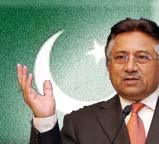New Pak regime finalises plan to ouster Musharraf
Sydney, Apr 19 :  The new regime in Pakistan is learnt to devised its strategy last night to oust President Pervez Musharraf by bringing about constitutional changes that would ‘curtail’ Musharraf’s powers.
The new regime in Pakistan is learnt to devised its strategy last night to oust President Pervez Musharraf by bringing about constitutional changes that would ‘curtail’ Musharraf’s powers.
Sources said that the constitutional changes were being prepared that would “so cripple (Musharraf's) authority in all respects” that he will have “no option but to bow out without facing impeachment”.
Sources close to the PPP and the PML-N said last night that after the deletion of discretionary and other powers, “Musharraf is unlikely to continue while having such an insignificant role”.
The changes would strip Musharraf of nearly all his discretionary powers, which sustain his hold on office - most importantly, the vital Article 58(2)(b) of the constitution that gives him the authority, at a whim, to dissolve parliament. Besides, he would be shorn of his powers to appoint service chiefs, the chief election commissioner and the auditor-general of Pakistan, reported The Australian.
The changes, which are expected to curtail the President's powers, are to be introduced alongside a resolution in the National Assembly, when it meets next week that will restore deposed chief justice Iftikhar Chaudhry to his old job before the end of the month.
Besides Chaudhry, the 60 other judges sacked by Musharraf would also be restored.
According to the paper, Musharraf's ouster would be a blow to the US administration and its widely criticised policy on Pakistan, which was attacked yesterday by the Government Accountability Office (GAO), the investigative arm of the US Congress.
In its latest report, the GAO said that even though the US administration faced an enhanced terrorist threat from al-Qa'ida safe havens in Pakistan's tribal areas, it had failed to develop a plan to deal with the situation. It sharply criticised the administration, saying that it had relied too heavily on Pakistani security forces to deal with a major US national security problem. (ANI)